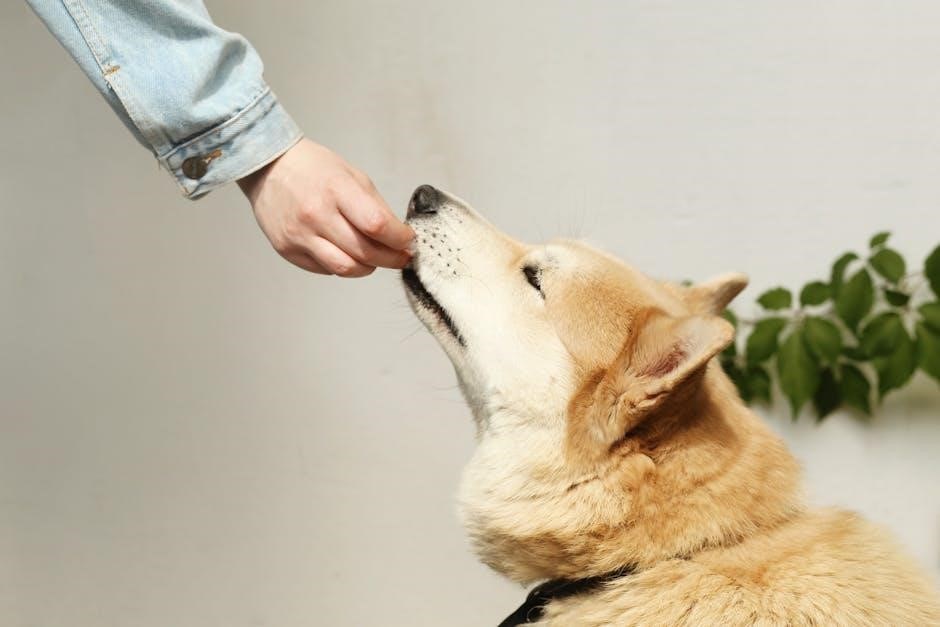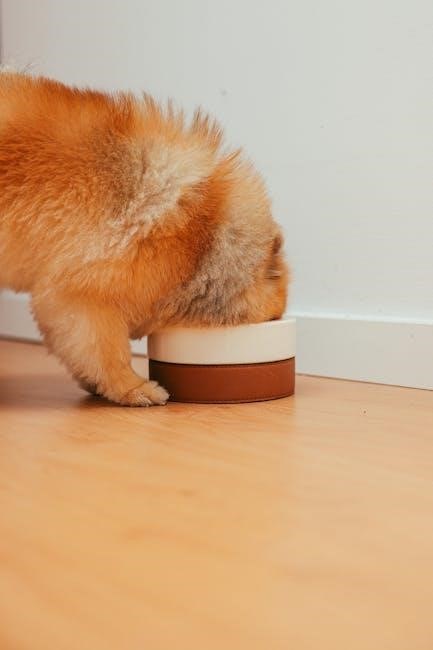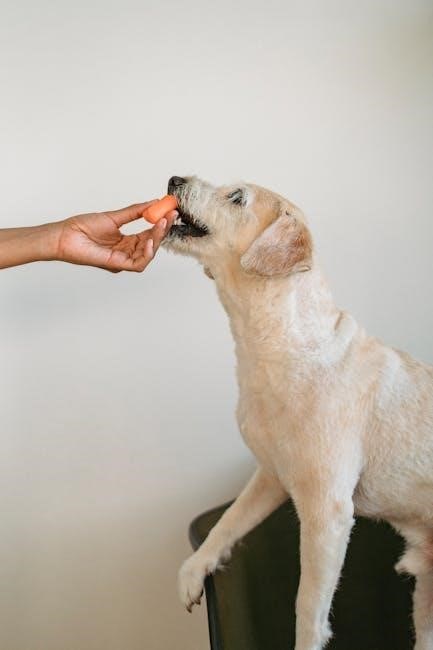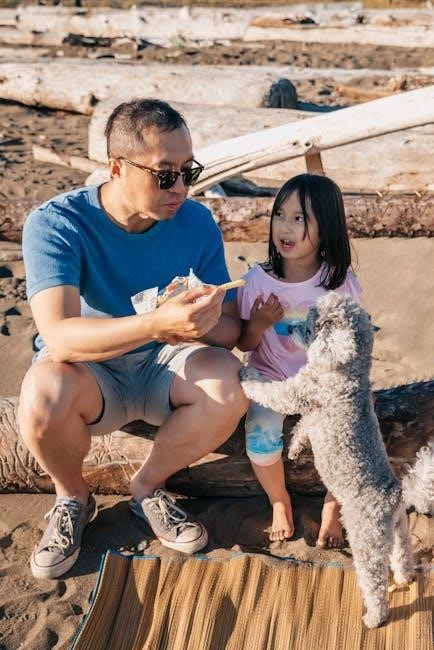
Feeding a Rottweiler puppy requires careful consideration of nutritional needs, with
guidance
from a veterinarian, to ensure proper growth and development, using high-quality food and a suitable feeding schedule always.
Importance of Consulting a Veterinarian
Consulting a veterinarian is crucial when it comes to feeding a Rottweiler puppy, as they can provide personalized advice and guidance. A veterinarian can assess the puppy’s overall health, growth patterns, and nutritional needs, and recommend a suitable diet. They can also help determine the optimal feeding schedule and portion sizes. This is especially important for Rottweiler puppies, as they have specific nutritional requirements that need to be met to ensure proper growth and development. A veterinarian can also help identify any potential health issues early on, and provide guidance on how to prevent or manage them through diet and nutrition. By consulting a veterinarian, owners can ensure that their Rottweiler puppy is getting the best possible start in life, and set them up for a lifetime of health and happiness, with a well-planned feeding strategy and regular check-ups. Regular consultations can help monitor progress and make adjustments as needed.
Individual Assessment and Diet Recommendations
An individual assessment of a Rottweiler puppy’s needs is essential for determining the best diet and nutrition plan. A veterinarian can assess the puppy’s health, age, weight, and activity level to provide personalized diet recommendations. They can also consider factors such as the puppy’s growth rate, muscle development, and potential health issues. Based on this assessment, the veterinarian can recommend a high-quality food that meets the puppy’s nutritional needs, and provide guidance on feeding schedules and portion sizes. This individualized approach helps ensure that the puppy is getting the nutrients they need to thrive, and can help prevent health problems down the line. By working with a veterinarian to develop a customized diet plan, owners can give their Rottweiler puppy the best possible start in life, and help them grow into a strong and healthy adult dog, with a well-planned diet and regular monitoring.

Nutritional Requirements for Rottweiler Puppies
Nutritional needs vary by age, size, and activity level, requiring a balanced diet with essential nutrients, using a
high-quality
food formulation always.
Protein and Calorie Needs
Rottweiler puppies require a significant amount of protein to support their rapid growth and development, with a focus on high-quality protein sources such as chicken, fish, and lamb. The calorie needs of Rottweilers also vary depending on their age, size, and activity level, with puppies requiring more calories per pound of body weight than adults. A balanced diet that meets the puppy’s protein and calorie needs is essential for optimal growth and development, and a veterinarian can provide guidance on the best diet for a Rottweiler puppy. The nutritional needs of Rottweilers can be met with a high-quality commercial dog food that is formulated specifically for large breed puppies, and a veterinarian can recommend the best food for a Rottweiler puppy based on their individual needs. Proper nutrition is essential for the health and well-being of Rottweiler puppies.
Life Stage and Size Considerations

Rottweiler puppies go through different life stages, from puppyhood to adulthood, and their size and nutritional needs change significantly during this time. As a large breed dog, Rottweilers require careful consideration of their size and life stage when determining their dietary needs. Puppies need more frequent feeding and a diet rich in nutrients to support their rapid growth, while adults require a balanced diet that meets their maintenance needs. The size of the Rottweiler also plays a crucial role in determining their nutritional needs, with larger dogs requiring more calories and nutrients than smaller ones. A veterinarian can help determine the best diet for a Rottweiler based on their life stage and size, ensuring they receive the necessary nutrients for optimal health and development. Proper consideration of life stage and size is essential for the health and well-being of Rottweilers. Regular monitoring and adjustments to their diet can help prevent health problems.

Feeding Schedule and Guidelines
Establishing a routine with a
schedule
is crucial for Rottweiler puppies, ensuring consistent nutrition always.
Large Breed Puppy Feeding Schedule
A large breed puppy feeding schedule is essential for Rottweilers, as it helps prevent overfeeding and promotes healthy growth. The schedule should be divided into several meals throughout the day, with the amount of food increasing as the puppy grows. It’s also important to consider the puppy’s activity level and adjust the feeding schedule accordingly. A general guideline is to feed 3-4 times a day, with the last meal being at least a few hours before bedtime. This allows the puppy to digest its food properly and prevents digestive issues. Consulting with a veterinarian can help determine the best feeding schedule for a Rottweiler puppy, taking into account its individual needs and growth rate. By following a well-structured feeding schedule, Rottweiler owners can help their puppies develop into strong and healthy adult dogs, with a reduced risk of obesity and other health problems.
Additional Information and Guidance
For Rottweiler puppy owners, it’s crucial to stay informed about the latest feeding recommendations and guidelines. Online resources, such as breed-specific websites and forums, can provide valuable insights and advice from experienced breeders and owners. Additionally, consulting with a veterinarian or a certified animal nutritionist can help owners make informed decisions about their puppy’s diet. They can offer personalized guidance on topics such as food allergies, sensitivities, and nutritional deficiencies. By staying up-to-date with the latest information and seeking expert advice, Rottweiler owners can ensure their puppies receive the best possible nutrition, setting them up for a lifetime of health and happiness. Regular check-ups with a veterinarian can also help monitor the puppy’s growth and development, allowing for any necessary adjustments to their feeding schedule and diet. This helps prevent potential health issues and promotes overall well-being.
Proper nutrition is essential for Rottweiler puppies, with owners needing guidance on feeding schedules and diets always using high-quality food and expert advice.
Right Nutrition for Rottweiler Puppies
The right nutrition for Rottweiler puppies is crucial for their growth and development, with a balanced diet providing essential nutrients, vitamins, and minerals, and owners should prioritize high-quality food and avoid overfeeding, using a suitable feeding schedule and monitoring their puppy’s health and weight, and adjusting their diet accordingly, as Rottweiler puppies have different nutritional needs at various stages of their growth, and a well-nourished puppy will have a shiny coat, healthy teeth, and a strong immune system, and will be less prone to diseases and health problems, and owners should work with their veterinarian to determine the best diet for their puppy, taking into account their age, weight, and activity level, and ensuring they receive the right amount of protein, fat, and carbohydrates, and staying informed about the latest research and recommendations on Rottweiler puppy nutrition, and being aware of the potential health risks associated with poor nutrition, such as obesity and malnutrition, and taking steps to prevent them, and providing a nurturing environment that supports their overall health and wellbeing.
Frequently Asked Questions

Many owners have questions about feeding their Rottweiler puppies, including what to feed, how much to feed, and how often to feed, and they may also wonder about the best types of food, such as dry or wet food, and whether to use a specific brand or recipe!
- they may also ask about common health issues related to nutrition
- and how to prevent them
and owners may also be concerned about the cost of feeding their puppy, and how to balance their budget with their puppy’s nutritional needs, and they may also wonder about the role of supplements and vitamins in their puppy’s diet, and how to ensure their puppy is getting all the necessary nutrients, and by doing research and consulting with a veterinarian, owners can find the answers to these questions and provide their Rottweiler puppy with the best possible start in life, and give them the nutrients they need to grow and thrive, with a healthy and balanced diet.




